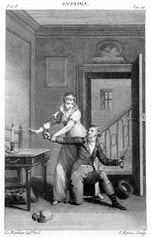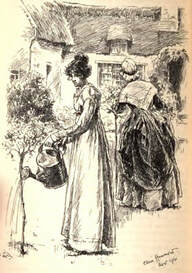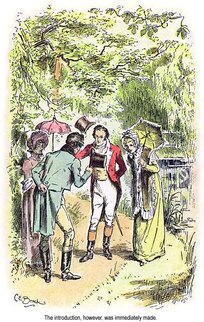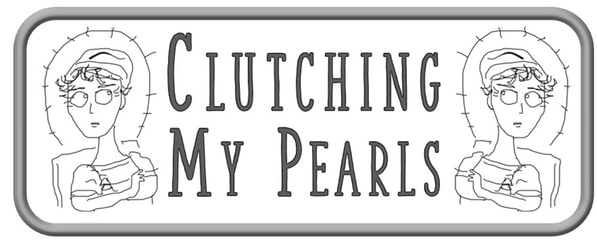| [On Anne Elliot bumping into Mr. Elliot in Lyme] "This passage serves to prove that without some degree of coincidence, a fictional world would not draw together so satisfyingly. A novel is art, not life, and we expect from it the unity and closure that often elude in real life, without the author seeming to manipulate the puppet strings too much. -- Maggie Lane, On the Sofa with Jane Austen |
In my previous post, I talked about how death solved a lot of plot conflicts for 18th century authors. So much so, that by the time I got to the fifth volume of Sarah Burney’s Traits of Nature, I was wondering, okay, is the author going to resolve her story with death or with coincidence? The inconvenient first wife has already died, do we need to clear off the disapproving father as well? No, we went with the amazing coincidence, or “isn’t this a small world” route. After Adela's brother falls in love with the sister of the man she loves, it's a happy ending for everybody.
 Evelina stops a stranger from doing something desperate
Evelina stops a stranger from doing something desperate Charlotte Smith’s orphan heroine Celestina doesn’t know who her parents are, but the mystery is solved when the man she loves gets lost in the Pyrenees. He stumbles into the only peasant cottage in all of Europe where he could learn the answer to the mystery. Celestina is in fact the daughter of a blue-blooded French nobleman.
In Maria Edgeworth’s Belinda, we meet Virginia, a beautiful, innocent, artless, girl. She is a secret ward of the hero; he has financially supported her ever since she was left alone in the world. The hero intends to marry her in time, but she is infatuated with a picture of a handsome young lieutenant. Well, what do you know: thanks to a string of amazing coincidences, we find the mystery man and her missing father (and dad's rich!) and everyone gets married to the person they really love.
 The artless, innocent Virginia in Belinda
The artless, innocent Virginia in Belinda Austen’s plots do have some coincidences. Maggie Lane in On the Sofa with Jane Austen has a good discussion of them. She points out that "Only Mansfield Park seems to be without coincidences of this ‘small world’ kind. No one turns up already knowing someone else." Colonel Brandon discovers that the seducer of his ward, the daughter of his first love, is the same man who has broken the heart of the girl he loves now. But the Eliza backstory and the seduction of Eliza's daughter takes place offstage. Likewise in Emma, the meeting of Frank Churchill and Jane Fairfax takes place offstage. They meet in Weymouth, but there are no reports of the dialogue between Frank and Jane to remind us of the remarkable coincidence that they come from the same small town (Oh, your father lives in Highbury! So does my aunt! Small world!). The even-more-fortuitous happening is a coincidental death -- the disagreeable Mrs. Churchill dies just when she should: Austen leans into this coincidence and has Mr. Knightley remark upon Frank Churchill’s extraordinary luck: “Frank Churchill is, indeed, the favourite of fortune. Every thing turns out for his good… His aunt is in the way.—His aunt dies.” These happenings also take place offstage and are related by letter.

The Gardiners were going to take Lizzy with them to the Lakes, but "they were obliged to give up the Lakes, and substitute a more contracted tour, and... were to go no farther northwards than Derbyshire... to Mrs. Gardiner it had a peculiarly strong attraction." The fact that they weren't initially planning to go to Derbyshire seems to cover up the coincidence that they end up at Pemberley. Elizabeth travels in two different directions from her home town, and each time, she meets up with the same man. England is not a large country, but this is still something of a stretch.
I will close with professor John Mullan: "Mediocre novelists try to avoid coincidences; better writers embrace them. Some of the greatest works of fiction turn on coincidences that no jobbing novelist would dare perpetrate. In Jane Eyre, for instance, the heroine, fleeing Rochester's house in a kind of panic, travels blindly across England before collapsing unconscious at the door of an isolated house in an unknown place. The inhabitants who take her in turn out to be her long-lost cousins."
Mullan says: "Novelists need to have the courage of their coincidences."
Previous post: Death and coincidence, part one Next post: If I'd only known
| Some Austen devotees have speculated that Harriet Smith is Miss Bates’s secret love child, because Miss Bates’s first name is also Harriet, though she is referred to as “Hetty.” I frankly think this is silly and a slur upon Miss Bates’s virtue. It's fair game to take the story in whatever direction you want for a JAFF variation, but I can't believe Austen would conceal a secret like this and not reveal it in a book that's filled with secrets that are revealed in the end. Author Allie Creswell does show us the meeting of Frank Churchill and Jane Fairfax in Weymouth along with lots of Bates family backstory in her Highbury Trilogy. Her story-telling is authentically Austenesque in tone and she stays within canon. |

 RSS Feed
RSS Feed